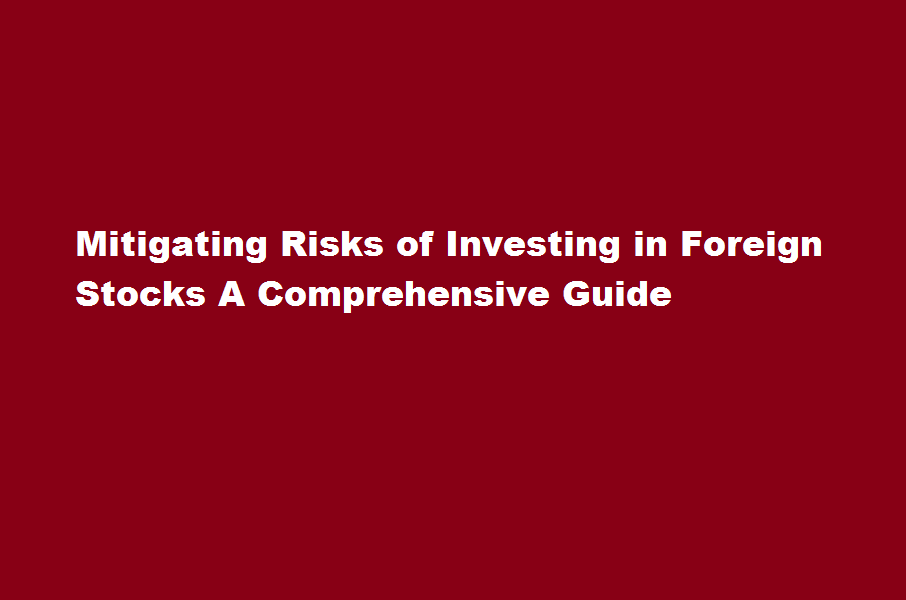Mitigating Risks of Investing in Foreign Stocks A Comprehensive Guide
4 min read
Introduction
Investing in foreign stocks can offer opportunities for growth and diversification, but it also comes with inherent risks. Understanding and mitigating these risks is essential for protecting your investments. This comprehensive guide provides strategies to mitigate the risks associated with investing in foreign stocks, including diversification, thorough research, risk assessment, hedging techniques, and the importance of staying informed.
Diversification
- Geographic Diversification Spread your investments across different countries and regions to reduce the impact of country-specific risks. Investing in a variety of markets can help minimize the impact of economic, political, and regulatory events on your portfolio.
- Sector Diversification Allocate investments across different sectors to reduce the impact of industry-specific risks. By diversifying your portfolio across sectors, you can avoid concentration risk and minimize the impact of a downturn in a particular industry.
Thorough Research
- Company Research Conduct thorough research on the foreign companies you are considering for investment. Analyze their financials, management team, competitive positioning, and growth prospects. Look for companies with a strong track record, sustainable business models, and transparent governance practices.
- Country Analysis Evaluate the economic, political, and regulatory factors of the countries where you plan to invest. Assess the stability of the country’s government, its fiscal and monetary policies, and the overall business environment. Consider factors such as GDP growth, inflation rates, and currency stability.
Risk Assessment
- Risk-Return Analysis Evaluate the potential risks and rewards associated with each investment. Consider factors such as volatility, liquidity, currency risk, geopolitical risks, and market conditions. Assess whether the potential returns justify the level of risk involved.
- Financial Risk Management Determine your risk tolerance and establish risk management strategies. Set clear investment goals, diversify your portfolio, and implement stop-loss orders or other risk mitigation techniques to protect against significant losses.
Hedging Techniques
- Currency Hedging Consider hedging your currency exposure when investing in foreign stocks. Hedging tools such as currency futures, options, or exchange-traded funds (ETFs) can help mitigate the impact of currency fluctuations on your investments.
- Derivative Instruments Depending on your risk profile and investment strategy, you may explore using derivative instruments such as options or futures to hedge against market risks. However, it’s important to fully understand the risks associated with derivatives before utilizing them.
Staying Informed
- Monitor Global Events Stay informed about global economic, political, and social events that may impact foreign markets. Follow financial news, read research reports, and analyze market trends to make informed investment decisions.
- Regular Portfolio Review Continuously monitor your portfolio and assess the performance of your foreign investments. Regularly review company and market updates, financial statements, and any changes in the risk landscape. Adjust your portfolio as necessary based on new information and changing market conditions.
Frequently Asked Questions
Can I completely eliminate the risks of investing in foreign stocks?
It’s not possible to completely eliminate investment risks, including those associated with foreign stocks. However, by adopting risk mitigation strategies such as diversification, thorough research, risk assessment, and hedging techniques, you can minimize the impact of these risks on your portfolio.
Is it necessary to hire a financial advisor when investing in foreign stocks?
While hiring a financial advisor is not mandatory, it can be beneficial, especially when investing in unfamiliar markets. A knowledgeable advisor can provide guidance, perform research, and help you navigate the complexities of international investing.
Should I prioritize risk mitigation over potential returns when investing in foreign stocks?
Balancing risk and potential returns is crucial when investing in foreign stocks. While risk mitigation is important, overly conservative strategies may limit potential returns. It’s important to strike a balance that aligns with your risk tolerance, investment goals, and time horizon.
Are there any regulatory differences to consider when investing in foreign stocks?
Yes, regulatory frameworks can vary between countries. Familiarize yourself with the rules and regulations governing foreign investments in the target countries. Understand the reporting requirements, tax implications, and any restrictions on foreign ownership or repatriation of profits.
How often should I review my foreign stock investments?
Regularly reviewing your foreign stock investments is recommended, but the frequency can vary depending on your investment strategy and market conditions. Assess your portfolio quarterly or annually, and make adjustments as necessary based on new information and changing circumstances.
Conclusion
Mitigating risks when investing in foreign stocks is essential for protecting your investments and achieving long-term success. Diversification, thorough research, risk assessment, hedging techniques, and staying informed are key strategies to mitigate risks associated with international investments. By adopting these practices and understanding the unique challenges of investing in foreign markets, you can navigate the risks and make informed decisions that align with your investment goals and risk tolerance.
Read Also : Understanding Taxes When Investing in Foreign Stocks A Comprehensive Guide






